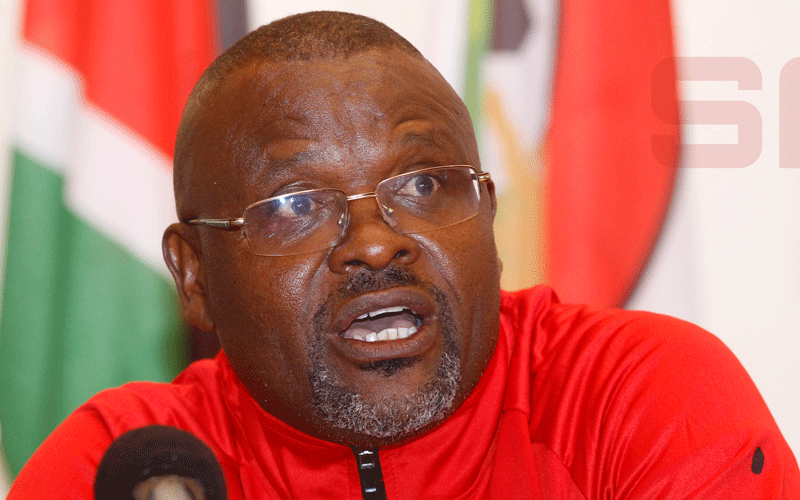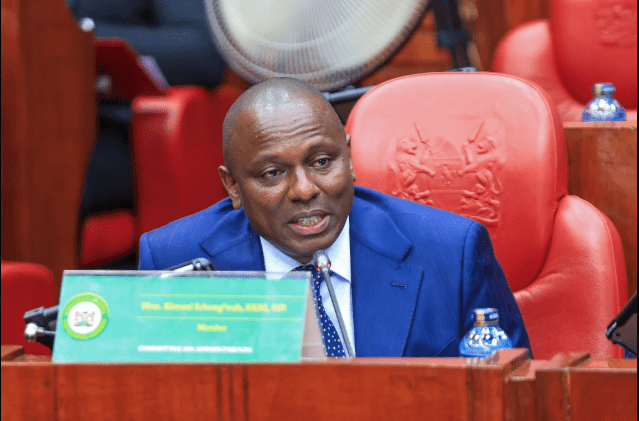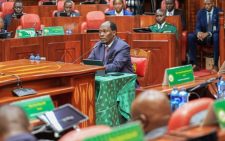Tuju, Salat put on notice for taking part in politics

Jubilee Party Secretary-General Raphael Tuju and his Kanu counterpart Nick Salat are among appointed State and Public officers that the anti-graft agency has put on notice for dabbling up in politics and public service.
In a move aimed at reining in officers engaged in both politics and public service, the Ethics and Anti-Corruption Commission (EACC) now wants all such officers to resign from one of their positions immediately.
Besides being the Jubilee Party Secretary General, Tuju is also a Minister without portfolio and sits and participates in all Cabinet meetings and affairs. Cabinet Secretaries are categorised as State officers.
On the other hand, Salat, the right hand man of Baringo Senator Gideon Moi, is the chairman of the Agricultural Development Corporation (ADC).
Tuju and Salat are among appointed Public and State officers that EACC want to immediately desist from engaging themselves in political activities that may compromise their offices.
EACC raised the red flag over State and Public officers holding positions in political parties and urged them to quit forthwith as they contravened the Article 77 (2) of the Constitution.
“The Commission advises that any public officer who could be currently holding an office in a political party is in violation of the law and liable to the applicable sanctions, including actions within their respective institutional codes of conduct and ethics,” EACC warned vide a memo dated October 1.
EACC chief executive Twalib Mbarak disclosed that the agency is already investigating several State and Public officers flouting the laws with their active engagement in active politics.
The EACC warning comes in the backdrop of heightened political activities in the country ahead of 2022 general election with a number of senior government officers, among them Cabinet Secretaries, Principal Secretaries, CEOs and chairpersons of state corporations, and chairpersons of constitutional commissions and independent offices being accused of taking sides.
Although President Uhuru Kenyatta has on several occasions warned State and Public officers to disengage themselves from politics, a number of them have been traversing the country issuing statements perceived to be partisan to the country’s political environment.
And despite many laws barring public servants from political party activities, a number of them have defied them as they continuously identified themselves with the Kieleweke political movement allied to President Kenyatta and ODM leader Raila Odinga.
Section 16 of the Public Officers Ethics Act requires state and public officers not to engage in any political activity that may compromise or be seen to interfere with the neutrality of their offices.
Mbarak now wants the national and county governments, Parliamentary Service Commission (PSC) and other independent constitutional commissions to take disciplinary action against officers flouting the law.
Last week, a lobby group, Concerned Citizen Alliance wrote to the Registrar of Political Parties Ms Ann Nderitu protesting the appointment of Salat as the chairman of ADC.
The Lobby while accusing Salat of contravening the Political Parties Act, 2011; The Public Officer Ethics Act, 2002; and Leadership and Integrity Act by doubling up as a state officer as well as Kanu Secretary General, wants him to be stripped off the two positions.
“Accordingly, any appointed public officer falling in the above category is required to immediately resign from such office,” Mbarak warned in his circular.
Mbarak in his circular says that the Commission has noted with concern that some public officers are actively involved in the promotion and advancement of activities and affairs of political parties.
“Public officers, as trustees of the people of Kenya, are expected to observe political neutrality, and at times direct their energies towards accountable, effective and responsive delivery of public services.
Mbarak says the laws barring public and state officers from direct engagement in politics were enacted to ensure that the officers uphold impartiality and objectivity in service delivery.
Furthermore, the laws are also in place to assist the officers avoid conflict of interest on the part of the officers and subsequently enable them to provide equal service to all “Kenyans from diverse social, political and cultural divides.”
“Accordingly, the Commission requires all appointed State and Public officers to refrain from any conduct that could be inimical to the above mandatory legal requirements,” Mbarak warned.












